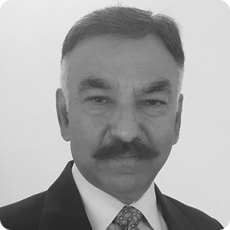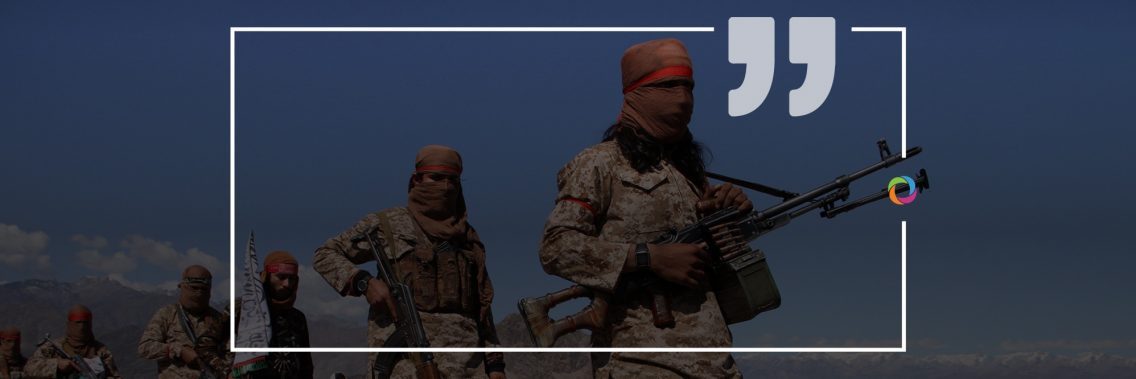Close your eyes and imagine waking up the next morning in a totally different world, having left everything you were used to behind. This is the situation Afghan people find themselves in these days. After 20 years of conflict, foreign forces should have withdrawn from Afghanistan following an agreement between the United States and Taliban militants who were ousted from power in 2001. The country’s former leaders have now conquered all its territories including the capital Kabul. We discussed this with several experts and asked them to comment upon the situation.
How do you comment upon America’s withdrawal from Afghanistan?

“Although the withdrawal by America was on the cards, it appears that several stakeholders assumed that it would not happen completely and that some kind of US presence would always be there. It has also exposed a fundamental error which occurred perhaps unwittingly. I believe that the entire focus of the US efforts in upgrading the Afghan army was in dealing with the terrorists and militants, and not so much on preparing the army to secure the territorial integrity of Afghanistan. Consequently, the focus of US support was on building special forces and intelligence organizations to deal with suicide attacks and bomb blasts within the country. This must have been on the assumption that Pakistan was unlikely to invade the country and the Taliban lacked the wherewithal. It was necessary to provide sufficient support to the infantry and also the artillery so as to ensure that borders were properly safeguarded, especially in the south and east of the country bordering Pakistan. This does not seem to have happened.”

“It is totally normal for donor countries to leave Afghanistan after they have accomplished their target. However, the definition of this “target” was not the same for the USA and Afghanistan. For years and years, we all knew that the USA was in Afghanistan: to remove terrorist groups from the country, to find and punish the persons/groups that organized 9/11, and to establish democracy and stabilization in Afghanistan. Of these main targets, the USA achieved only the second one. For the others, the USA, the UN, the EU, and other donor countries and organizations achieved partial success, working on “progress”. The main obstacle was the security situation in the country. Although the Afghan Army, which had almost 300,000 soldiers, was having severe difficulties stopping the violence of Taliban, IS and Haqqani terrorist groups, they could fight against them. Most of the country was still under the complete control of the Afghan Government. Later, the Trump administration announced the full withdrawal of Afghan troops from Afghanistan by 11 September 2021. In line with this decision, the USA started peace talks with the Taliban. The idea was to find a non-military solution and agreement between the Afghan Government and the Taliban. In this way, lasting peace and stability was the aim for the country. The idea was to set up a mixed government management model between Sharia and the Parliamentary system in Afghanistan. However, the main mistake of the USA was failing to understand the Taliban and Islamic Sharia rules. Taliban follows Islamic Sharia law, and there is no compromise between Sharia law and the Parliamentary system. According to Sharia law, either a person follows Sharia law or they are against Islam. Indeed, the head of the Taliban recently announced that they would follow Sharia and all social and business life would be defined according to the rules of Sharia. Lastly, the USA and NATO didn’t seek the views of Afghans when they arrived in Afghanistan in 2001. They didn’t ask the opinions of Afghans either while they were re-establishing the country or when they decided to leave the country. If the ultimate goal was to hand over the country to the Taliban, Afghans have the right to ask them this question: “why did you come to Afghanistan in 2001 and make so many promises”?”

“The USA came to Afghanistan with certain and defined objectives, to destroy the Islamic political extremists’ hubs and their camps. The USA achieved their objectives when they eliminated the Al Qaida leader in Pakistan. Therefore, the withdrawal of the USA from Afghanistan was to be expected irrespective of its outcomes. It could have happened earlier or later and I would call this “withdrawal” unexpected since billions of dollars have been invested in Afghanistan but with little results and outcomes, nevertheless, the USA decided to leave Afghanistan.”

“To me, it seems that the withdrawal was weakly and irresponsibly planned and implemented. The expectations of Afghans and all other partners were to have a smooth and logical shift in a timely manner, not in the hurry with which it happened and creating such huge chaos.”
What is the impact of the Taliban’s return on the international order?

“It is an unfortunate happening because democracy has been defeated by fundamentalist forces known to have committed serious violations of human rights in the past. Countries hostile to the US are likely to support this order as also those countries who have a certain game plan in Central Asia and Southeast Asia. Without reliable input as to what transpired between the US and the Taliban at Doha, it is difficult to predict how widespread the acceptance of this change will be on the world order. It is significant that China has not evacuated its embassy in Kabul. This indicates that there is an understanding between the former and the Taliban, either directly or through Pakistan.”

“The impact is currently visible in Afghanistan. A humanitarian tragedy and chaos are currently happening in Afghanistan. Millions of Afghans are trying to escape from the country. The most vulnerable are women and children. Furthermore, the international community is not ready for another significant refugee crisis after the one in Syria. Almost 30 million people are living in Afghanistan. If they had the chance, the vast majority would leave the country today. The Taliban is not the choice of the Afghan people. Some people claim that Taliban management is in line with the lifestyle of the Afghan people. This is wrong. Afghans have never followed a government system based on Sharia law in their history. Furthermore, the Taliban cannot set up a system that will protect the rights of nan-Pashtoon ethnic groups and women. Therefore, it is unlikely that the Taliban will integrate into the international system. However, the Taliban management uses key figures like Karzai and Abdulla Abdulla to show that they are willing to integrate into the global system. In the short term, the impacts of the Taliban will be that the Afghan people who have a chance to leave the country will escape from Afghanistan, there will not be stability in the country, international funding will sharply decrease, the vast majority of countries will not recognize the Taliban administration and Afghanistan will become a land of crime and terrorism.”

“The Taliban came to power by force and it does not matter if they entered Kabul without a fight. They disposed the legal government in Kabul which came to power by-election. Now the world again faces the dilemma of whether to recognize them as a government or not. The Taliban control Afghanistan but the power of the legal government extends to only a small valley in Panjir in the northeast. But nevertheless, the world has to work with the Taliban for the sake of the Afghan nation and for the sake of the social changes that happened in the last 20 years.”
Could the Taliban’s return mean a worse security threat than pre-9/11?

“Unlikely because during the previous times the US and other countries had a certain limited interest in Afghanistan which was not at the core of their geopolitical interests. Post 9/11, the scenario changed completely, resulting in the US intervention which lasted for two decades. The Afghans and the fundamentalist forces would then not have imagined the extent to which the US and other countries of the West would get involved. Therefore, this time around, the Taliban and their supporters are likely to proceed cautiously and specially an effort to prove to the world that they are not the same as their previous incarnation. The above hypothesis is for contemporary times. Once properly established, the Taliban is likely to pursue a course of action that will convert the country into a proper Islamic dominion. Since it will receive both overt and covert support from Pakistan, there is a distinct possibility of terrorist groups including Al Qaeda finding a haven in these newly “liberated” territories.”

“It is essential to understand that the Taliban did not organize 9/11, but that Al-Qaeda managed it. The Taliban was administrating Afghanistan in 2001. The Taliban didn’t cooperate with the USA and NATO to capture Osama bin Laden. Later on, Osama Bin Laden was killed in a small town not far from the capital of Pakistan, Islamabad. Currently, Al-Qaeda, IS and Haqqani terrorist groups are still based in Pakistan in the Khyber Pakhtunwaa and Baluchistan regions and they will continue to be there. The Taliban has a strong relationship with them, and this will not end after they captured Afghanistan. In addition to this, the Taliban is stronger now because they have the well-developed weapons of the USA/NATO which were left for the Afghan Army. Lastly, the Taliban is trying to integrate Afghan soldiers into their system. Once this is done, the Taliban will be a power with war planes, tanks, advanced weapons, well-trained soldiers, etc. The USA and NATO hope that the Taliban will integrate into the international system. But such hopes have always failed in history. So, overall, the Taliban is now a greater threat not only for the USA but the entire world.”

“The Taliban has assured the world that they won’t provide a hub again for the international terrorists and extremists in Afghanistan. But in my opinion, they are cunning and the world should monitor the situation in Afghanistan since the Taliban are not the Taliban without their networks and links with other Jihadi organization in the region. They would also provide Afghan soil for the Jihadi groups which, in the mid and long term, could again jeopardize the region and the world. Therefore, the world has no choice but to monitor Afghanistan, to support the anti-Taliban so-called “North Alliance” again as it did 20 years ago and to target certain Jihadi groups in Afghanistan.”

“It could be. Perhaps the bigger question is how effective is the international community’s approach when it can spend trillions of dollars and put so many resources into one location and two decades later the same ideology it had encountered all those years ago returns.”
How do you see the future of Afghanistan after the Taliban’s return?

“The future does not inspire confidence. During the last two decades of US-led international support to Afghanistan, certain positive developments have taken place. For instance, two democratic elections were held resulting in the people experiencing the fruits of democracy. Women’s literacy rose to 37% and both the electronic and print media were largely independent and developed well. This progress is likely to be reversed. Furthermore, such is the reputation of the new occupants that foreign business investment, which was, in any case, limited, is likely to dry up. Pakistan and China will certainly be there for them whereas Iran (a Shia country) and India will probably have a need-based approach in dealing with them.”

“There is so far no single piece of positive news to be optimistic about the future of Afghanistan after Kabul’s fall. The economic situation of the country was bad before the Taliban. Now, it will be even worse. Social life was somehow continuing and women were part of it. But this will not be possible anymore. The Government’s basic services (health, education, and infrastructure) will worsen. The Taliban does not have the money to pay the salaries of public workers and run the system. The rule of law system has collapsed in the country and the Taliban cannot re-establish it. They can only use a Sharia-based rule of law system which will cause serious human rights problems in the country. Therefore, the chaos will deepen in the country. The other terrorist groups outside of Afghanistan will be encouraged further. Indeed, the radical groups in Mali attacked government forces and killed many people a few days ago. We will hear more and more news like this in the future such as the IS terrorist groups being encouraged further and trying to launch more attacks in Syria. While many Afghans try to escape from Afghanistan, some Afghans (including Afghan army members) will gather and set up a force against the Taliban in the country. Indeed, there is such a group in the Panshjir and Baghlan provinces of Afghanistan. There is a fight going on between the Taliban and these groups who will be supported by the Central Asian countries that do not want to see the Taliban administration as a neighbour. Lastly, the vast majority of countries will not recognize the Taliban and that means no international funding will arrive in Afghanistan. This will cause severe economic problems for the people of the country. As a result, more people will try to migrate to other countries.”

“Unfortunately, since the Taliban has come to power, Afghanistan will enter a new phase of political turmoil and uncertainty. The young people who were born and educated within the last 20 years will continue to leave Afghanistan since they see no hope for the country. The rights of women, religious and national minorities, and political parties will again be questioned by the Taliban. The Taliban will try to consolidate their power throughout Afghanistan and will face resistance from other political and national groups and all democratic achievements (human rights, social and economic infrastructures, women rights, etc.) could be destroyed again.”

“It will not be good. The Taliban are an ideological force that is in total opposition to freedom of expression, women advancement, development of Afghanistan, or its modernization. And ultimately the Taliban will work to ensure the further weakening of the Afghan national identity.”
What do you think will happen to projects that have been implemented/are currently implementing by international donors?

“Several international organisations such as the UN, the European Union, and GIZ have been supporting institutional development in various entities of the government in Afghanistan. Laws have been drafted, suggestions for the reengineering of business processes have been made to various government organisations including the police and even parliamentary processes have been established. All the work done will, without doubt, be reviewed by the new rulers and that which does not meet with the requirements of Sharia is likely to be discarded or modified.”

All ongoing projects will stop. The international staff (working for the UN and other organizations) currently based in Afghanistan will leave the country. The global funding for UN projects and other organizations will decrease sharply. The UN is presently still in Afghanistan but they will not be able to run any projects for a long time. The UN mission will be downsized and will operate only as a political communication office with the Taliban.”

“This is the main issue which concerns the world community. I was part of such projects and programs. We thought about the sustainability of the projects during the Karzai and Gani government when the world was inside the country. But now that the Taliban has come to power, everyone is trying to leave the country asap which will impact the projects in Afghanistan. The connection should be built up between the Taliban and international donors to monitor the existing and to implement future projects which will not be an easy job when the Taliban comes under sanctions again.”

“We are presently in a very ambiguous situation because things are not clear from all sides. The formation of an inclusive government, respect for human rights, and for international rules and regulations can pave the way for international donors to keep to their commitments. One thing I want to mention is that the international community has to give Afghans a chance to form the government they want keeping in mind the above-mentioned points. International funding has already been interrupted. Once the policies of the new Taliban government are clear, I hope they will return and they have to return to support Afghans to build their country and become an active part of the global family.”

“The projects will eventually disappear but we should be aware that programs will no longer be implemented even though those Afghans who participated in them have been positively affected and most likely they have made a difference in their lives. They carry those skill sets with them as they move on with their lives. If there are international sanctions most likely lots of organizations will pull out and not be involved in Afghanistan. But also working in an environment controlled by the Taliban will make it next to impossible to carry out effective programming besides perhaps food or limited health programs.”
What should the international community do to protect human rights in Afghanistan and prevent ‘civilian slaughter’?

“A segment of the international community which is known for its humanitarian approach and has an impartial reputation needs to engage with the Taliban and assist with setting up arrangements that are consistent with the UN Charter. They should offer to assist in creating organizations that protect the life, liberty, and property of citizens and that allow for individual development in the economic, social, and political fields and also of communities such as the Pashtuns, the Hazaras, the Uzbeks, or the Baloch. Insistence on following Islamic tenets will be there which should not be difficult to follow so long as these are consistent with human dignity. Islam prescribes equality for women. Unfortunately, not just the Taliban but some Muslims too do not follow this. Undoubtedly this will need persuasion amongst a certain section of the Taliban but given their current stance of appearing to be different from the previous version, it may just be possible to make them see reason, at least for now. Finally, if there are reports of the wide-scale slaughter of civilians, the international community through the medium of the UN, must launch a decisive military intervention, along with countries in the region who cherish and protect human rights in their own territories.”

“First of all, the USA and NATO should set up refugee settlements within Afghanistan and protect them. Settlements such as these can be in a specific region of the country and international forces should protect the security of this region. In this way, Afghans who do not feel safe can go there until they see that the Taliban will provide a secure life for all Afghans. It is a solution to transport Afghans by cargo planes out of Afghanistan. NATO must define a certain zone/region (like it has done in Iraq and Syria) in Afghanistan. Then Afghans who do not feel safe can move to these special regions. NATO and the USA should provide a secure passage/transfer for people and the security of these special regions. Later on, humanitarian organizations can run their projects in these regions. In this way, international help reaches the people who are in need in the country. Otherwise, there will be another large refugee crisis in the world. Most importantly, there is no way Afghanistan’s and Turkey’s neighbouring countries can handle such large refugee flows.”

“The only tool to protect human rights and prevent “civilian slaughter” in Afghanistan is to maintain political and economic relations with the Taliban and try to keep the door open to dialogue with them since they are keen to be part of the world community. On the other hand, try to help the conflicting sides to come together to end the conflict and to start the political settlement.”

“In my opinion, the Taliban are now in full control of the country so the international community has to find ways to engage with them and let them become healthy and peaceful partners of the international community. What the international community has to do is to keep engaged and avoid abandoning them in order to block the way for those groups who want to disturb the international order and benefit from the situation in Afghanistan. The international community has to avoid imposing their wishes on Afghans, let them choose their way of living and the formation of a government through inclusive consultation. The past government failed to do so. Afghanistan has a very long and rich history of counseling and I hope they will choose their way through that and the international community has to help Afghans with this.”

“We must continue to shine a light on Afghanistan or else we will see the worst type of killing and oppression. Countries like the United States must take the lead and ensure that Afghanistan does not slide back to the 1990s although not being on the ground will make this extremely difficult.”
Check out more than 50 job opportunities in the conflict sector here.

